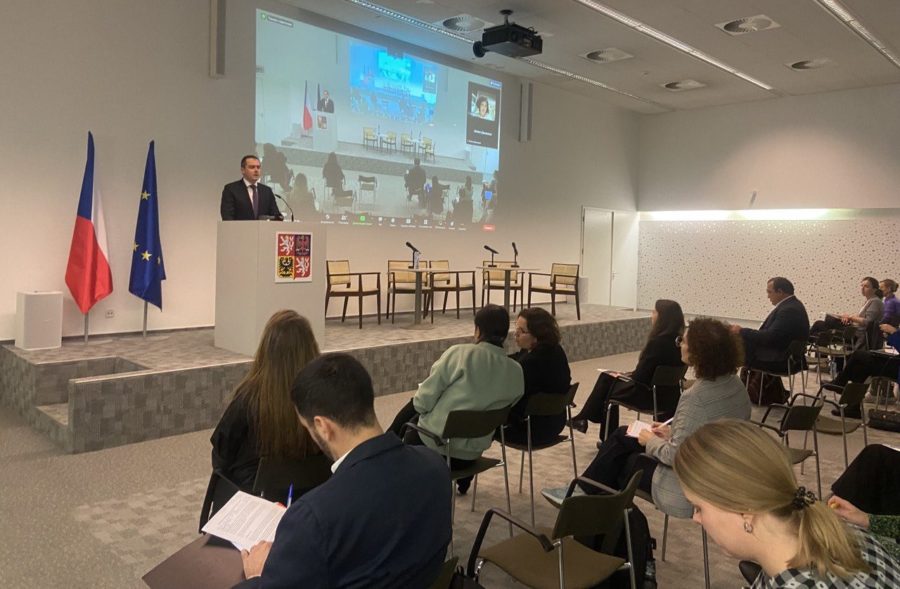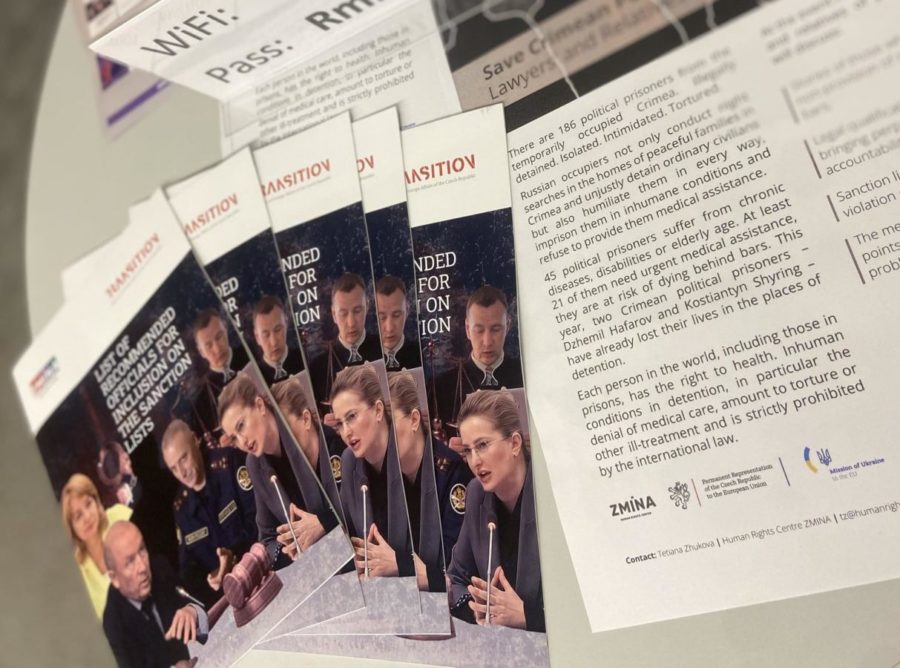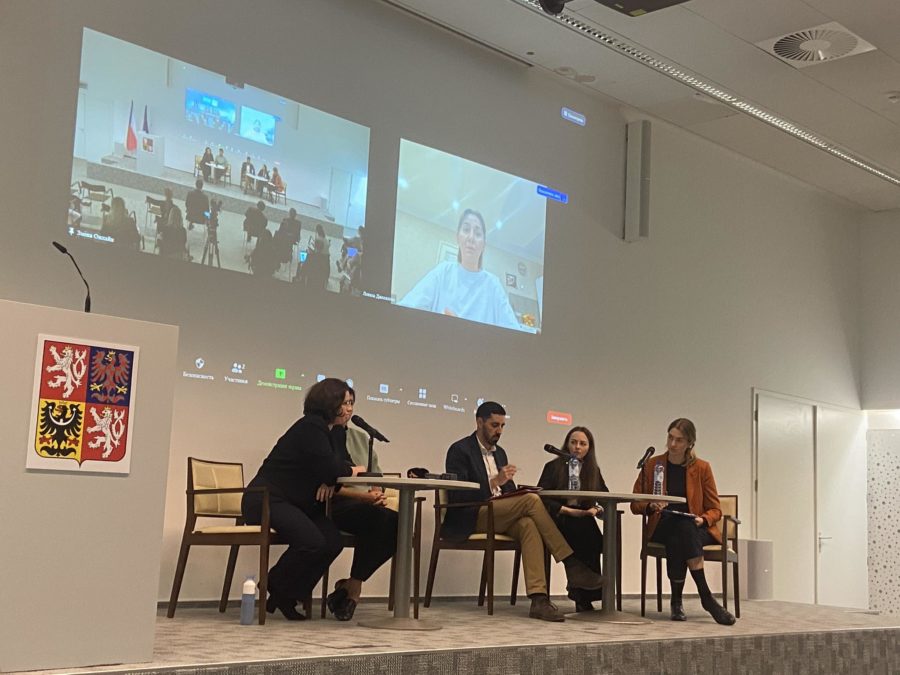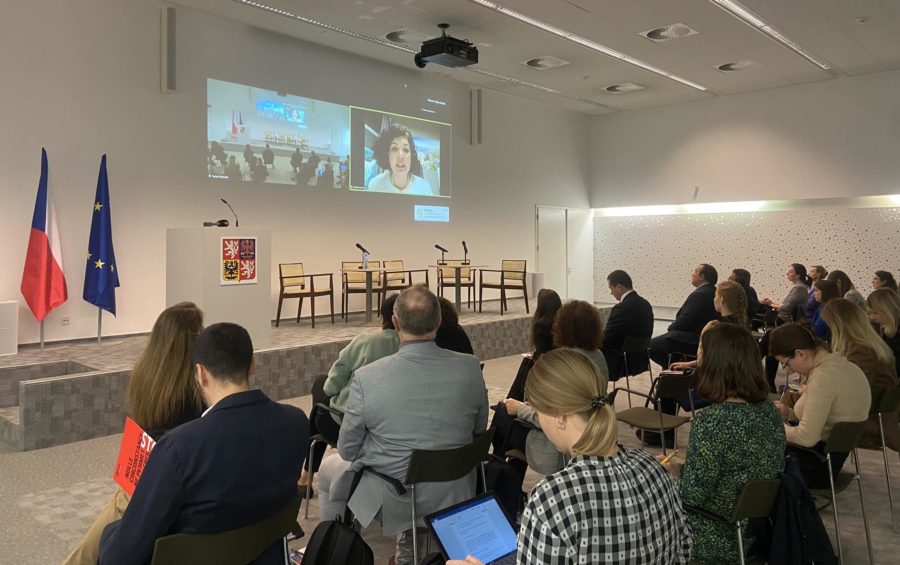ZMINA discusses rescue of Crimean political prisoners in Brussels
Human Rights Centre ZMINA in cooperation with the Permanent Representation of the Czech Republic to the EU and the Mission of Ukraine to the EU held the event “Save Crimean Political Prisoners at Risk: Lawyers’ and Relatives’ Testimonies” in Brussels on October 19. The event was attended by diplomats of various countries in the EU, employees of European institutions, representatives of civil society and journalists.
 Photo: ZMINA
Photo: ZMINAAmbassador Vsevolod Chentsov, Head of the Mission of Ukraine to the European Union and the European Atomic Energy Community, Veronika Mítková, Director of the Human Rights Department at the Ministry of Foreign Affairs of the Czech Republic, and Tamila Tasheva, Permanent Representative of the President of Ukraine in the Autonomous Republic of Crimea, made opening remarks.
“The occupation of Crimea began almost 10 years ago. Russia has brought suffering, human rights violations and the degradation of all possible democratic standards. It oppresses the population of the peninsula, civil society and self-government,” Ambassador Vsevolod Chentsov noted.
 Photo: Ambassador Vsevolod Chentsov. Credits: ZMINA
Photo: Ambassador Vsevolod Chentsov. Credits: ZMINA“Today we see a growing number of arrests in the territory of occupied Crimea due to the active resistance of Ukrainian citizens to the Russian occupiers. These are partisan movements, such as Yellow Ribbon, Atesh, Zla Mavka, and Crimean Fighting Gulls, as well as individual cases of resistance demonstrated by our citizens, for example, by singing patriotic Ukrainian songs or depicting Ukrainian symbols in public places,” Tamila Tasheva said.
During the expert discussion, human rights defenders and relatives of political prisoners discussed the persecution happening on the peninsula, the stories of Kremlin prisoners who suffer from the non-provision of medical care behind bars, legal aspects and ways of holding the guilty to account, as well as mechanisms and potential points of influence to solve the problem.
 Photo: Reports. Credits: ZMINA
Photo: Reports. Credits: ZMINA“Analyzing the cases, we see that the transfer of political prisoners and the systematic non-provision of medical aid is a continuation of the political persecution of illegally convicted Ukrainian citizens by the occupation authorities,” ZMINA project manager Viktoria Nesterenko emphasized, “The occupation regime in Crimea illegally holds behind bars 186 political prisoners, 45 of them have chronic health problems and 21 need urgent medical care.”
Relatives of the Kremlin’s Crimean prisoners also took part in the meeting, told about the condition of their relatives and called for their rescue. Kateryna Yesypenko, the wife of political prisoner, journalist Vladyslav Yesypenko, spoke about the torture her husband suffered. Bronislav Danylovych, the father of political prisoner Iryna Danylovych who lost hearing in her left ear due to the terrible detention conditions and lack of medical assistance, made a video address to the diplomats. Leviza Dzhelyal, the wife of political prisoner Nariman Dzhelyal who was not only denied medical care but was also transferred thousands of kilometers from his native Crimea to Krasnoyarsk Krai of the Russian Federation, spoke online.
“Being in illegal detention is a threat not only to their health but also to their lives,” Leviza Dzhelyal emphasized.
 Photo: Bronislav Danylovych. Author: ZMINA
Photo: Bronislav Danylovych. Author: ZMINAMiguel Martín Zumalacárregui, Head of the Brussels office of the World Organisation Against Torture (OMCT), said that failure to provide medical care was a form of torture and inhumane treatment under international law, so all those involved in it must be held accountable.
In addition, the discussion participants noted that it was necessary to impose sanctions for violating the rights of Kremlin’s prisoners, as well as to become the voice of political prisoners and share their stories. In particular, Veronika Mítková, Director of the Human Rights Department at the Ministry of Foreign Affairs of the Czech Republic, said that the Ministry was going to join the information campaign #SavePoliticalPrisoners to spread information about the non-provision of medical care to political prisoners.
 Photo: ZMINA
Photo: ZMINAViktoria Nesterenko from ZMINA emphasized the importance of creating a mechanism for the release of prisoners. According to her, the number of political prisoners in the occupied Crimea is constantly increasing, but neither exchanges nor releases have taken place for a long time. Some prisoners are in critical condition, many of them were transferred to the Russian Federation far from home. In the past two months alone, the occupation authorities deported five Ukrainian citizens to Russia, including Amet Suleymanov, Nariman Dzhelyal and Iryna Danylovych. In this way, the Russian Federation makes access to prisoners difficult for their families and lawyers, especially if the prisoners have health problems.
“A new mechanism, systematic and balanced steps by the international community, authorities and human rights organizations are necessary: international advocacy, involvement of intermediary states for agreements on release, support for families and especially the imposition of sanctions on officials directly involved in the persecution of political prisoners in the occupied Crimea,” Nesterenko added.
 Photo: Tamila Tasheva. Author: ZMINA
Photo: Tamila Tasheva. Author: ZMINA“I believe that Crimea will definitely be de-occupied, and all political prisoners will be released from Russian captivity, and such events as the Parliamentary Summit will help speed up this process and contribute to a more successful reintegration of the peninsula,” said Tamila Tasheva, the Permanent Representative of the President of Ukraine in the Autonomous Republic of Crimea.
“In the coming days, Ukraine and the Czech Republic will hold the Second Parliamentary Summit of the Crimea Platform in Prague. We firmly believe that the Summit will contribute to the unity of the international community in the protection of international law, as well as the establishment of a comprehensive, just and lasting peace in Ukraine and security in the whole world,” Ambassador Vsevolod Chentsov concluded.
Background: The Second Parliamentary Summit of the International Crimea Platform will be held on October 24 in Prague, the capital of the Czech Republic. Its purpose is to unify and coordinate national and international efforts in matters of de-occupation of the Crimean peninsula, support for the restoration of Ukraine’s territorial integrity, Ukraine’s path to the EU and NATO, as well as the implementation of the Peace Formula of President of Ukraine Volodymyr Zelensky. Almost 70 foreign delegations will take part in the Summit.
If you have found a spelling error, please, notify us by selecting that text and pressing Ctrl+Enter.















